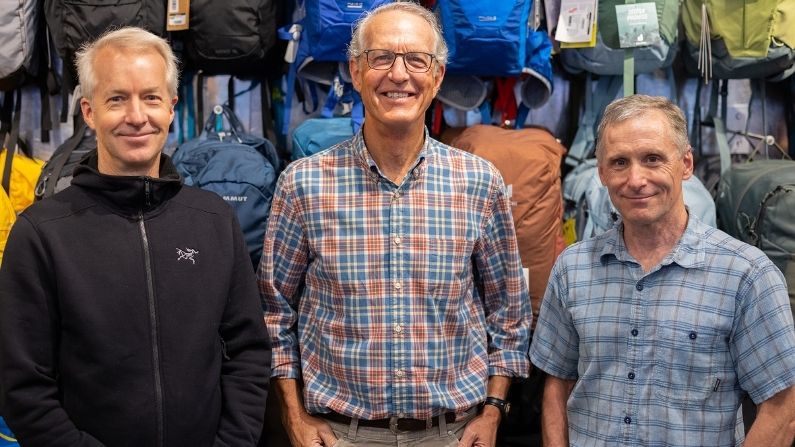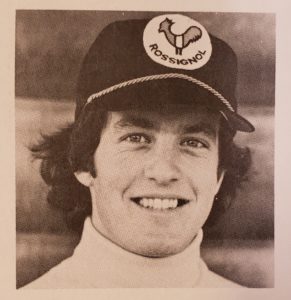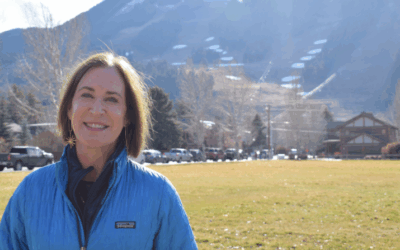In the 44 years that Phil Leeds owned Skinny Skis, Jackson and the outdoor gear industry have both changed a lot. Leeds recently retired as co-owner of the iconic sporting goods store, and KHOL Executive Director Emily Cohen spoke with him to reflect on his long career and what he thinks has made Skinny Skis such a successful local business.
The following interview has been edited for brevity and clarity.
EMILY COHEN/KHOL: You’ve seen Jackson Hole and the retail industry change a lot over your career. I want to take a moment and talk about both of those things.
PHIL LEEDS: Well, obviously everybody, I think in the valley that’s been here for a few decades, like I have, [have] seen a number of changes. The community-mindedness, I think, is as strong as it’s ever been. It was a big component back then, you know, in the 1970s and early 80s, and it still remains strong. And you can see that in participation with nonprofit groups, the number of nonprofit groups and things like Old Bill’s. But the way to conduct business has changed markedly.
So, back in the late 70s, communicating with companies was primarily done through with sales reps at trade shows and over the phone or mail. The way we conducted business and the relationships we built were so different.
The gear has changed a lot. But I would say, given the fact that it’s been 40-some odd years, it really hasn’t changed that significantly. When you get right down to it, whether you’re talking Nordic ski equipment, running shoes, camping and backpacking gear. I mean, the changes have been, you know, substantial. But when you look at other things in our life and how things have changed, especially with technology, those components largely, you know, they evolve, but it wasn’t like a complete game-changer.
KHOL: What is your forecast for the industry, the outdoor gear industry?
LEEDS: Oh, that’s a tough one. We’ve all seen it evolve tremendously, and I think the last couple of years with COVID has modified things even more. There’s been an evolution going on with digitization and B2B, and certainly with the internet and people’s ability to find products online 24/7 or visit stores or hybrid kinds of models, that has been evolving for 20-some odd years. But it was increased, I think markedly some of these elements just in the last year or so.
KHOL: And when you got involved with Skinny Skis originally, what did you seek to do? Did you have any sort of endgame in mind?
LEEDS: Yes and no. I enjoyed business. I was an economics major in college. I met my partner, Jeff, in the early 70s, working up in Grand Teton National Park, and he described opening the business in 1974. And we remained friends, and I joined him and another fellow in 1977. In that timeframe, when I was still in college, I was given the opportunity to manage a ski department in a sporting goods store in California, where I was in college. So I kind of had the best of both worlds being able to study economics kind of by morning, academically and then virtually every afternoon managing a ski department in a sporting goods store.
KHOL: Any advice for a small business owner just starting out now, maybe advice that you wish you had gotten when you were a newbie?
LEEDS: I think understanding the community that you’re serving is of the upmost importance. I mean, I think it’s very challenging for somebody from outside, whether you’re an REI size business or whether you’re a ma and pa kind of business, you know, coming into an area for the first time. But if you’ve had a pulse of the community for years, if not decades, and you really understand where the community’s coming from and then you try to meld that with your idea about something that you feel is kind of missing in the community. Whether it’s a service or a product line, you’ll have a much greater chance of success or bringing the two together and really honing in on what you do.
People have choices in their day-to-day purchasing, whether it’s outdoor gear and clothing or other aspects of products and services. And so it really forces businesses to be like celebrities, to hone in on what they do best and communicate super well with the community that we’re involved with and grow with it.
KHOL: I think it’s the same in radio! Well, Phil Leeds, thanks for joining us today and best of luck in this next chapter.
LEEDS: It’s been a pleasure. Thank you.







